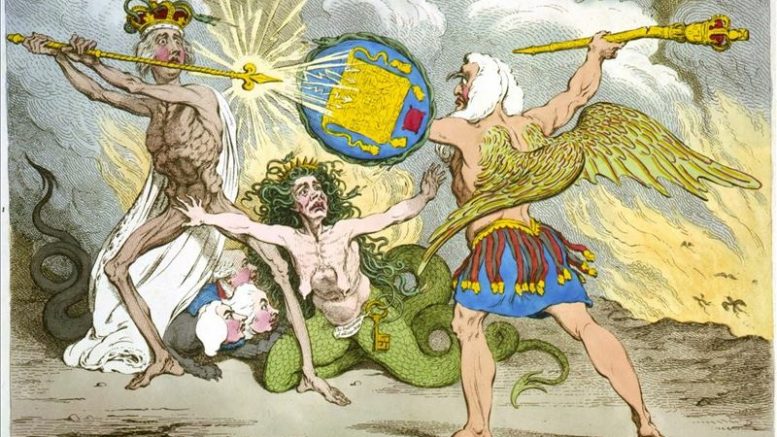Ignorance and naivety about the politics of trade are the biggest dangers facing the May government, Geoff Kitney writes.
The challenge of delivering the centerpiece of Brexit Britain’s plan for not only surviving, but prospering, after it leaves the European Union (EU) – becoming a trade superpower – appears already to be in jeopardy.
Ignorance and naivety about the politics of trade have hit the May government hard.
Several events in the past week should be ringing alarm bells in Whitehall and Westminster, but they appear to be going either unnoticed or being deliberately downplayed in the lead up to the general election.
Two key policy-related developments sat jarringly alongside insouciant remarks on trade by David Davis, the leader of the Brexit process: a ruling by the European Court of Justice (ECJ) on the competencies of the European Commission (EC) in negotiating free trade agreements (FTAs) and a salutary study by the UK’s Institute for Government on the challenges the UK faces in negotiating trade agreements.
In an interview last week on the Peston on Sunday programme, Mr Davis gave answers about the challenges facing the UK in securing a free trade agreement with the EU that were either disingenuously misleading or scarily at odds with reality.
Going it alone will not free Britain from being subject to international jurisdiction
Those realities – highlighted by the ECJ ruling and the IFG analysis – confirm what independent experts have been saying – that the challenges of negotiating trade agreements, firstly with the EU and subsequently with vital trading partners, are going to be formidable and long-lasting.
In one instance, Mr Davis seemed utterly oblivious to a fundamental fact of life for post-Brexit Britain – that going it alone will not free Britain from being subject to international jurisdiction.
Asked by Robert Peston about the rights of EU citizens in the UK post-Brexit era and the role the European Court of Justice might play in upholding those rights, Mr Davis said he was “slightly offended” at the idea that the ECJ could have a role upholding these rights.
Harking back to one of the core pro-Brexit slogans – that this was about reclaiming British sovereignty from EU bodies – Mr Davis said that the UK Supreme Court could deal with these issues without any interference from the ECJ. But in trade politics, there has been a strong move away from sovereign rights for national governments, towards international jurisdiction.
In negotiations for trade agreements it is now normal for the parties to insist on including provisions for the creation of international tribunals to consider and make awards for damage where foreign corporations demonstrate that sovereign decisions have harmed their business interests.
These tribunals – known as Investor to State Dispute Settlement (ISDS ) tribunals – have grown out of concern by powerful business interests that national courts cannot be relied upon to make judgements in favour of foreign interests.
And in view of the recent ugly trend in Britain of political figures and others seeking to intimidate the judiciary when rulings did not fit their Brexit agenda, it is unlikely that the UK will be able to do a single trade deal without handing sovereignty over to ISDS courts.
[The UK] will only reap the benefits of taking back control of trade policy if government radically changes the way it operates
In the ECJ’s ruling on the European Commission’s competency to sign trade agreements without first seeking the approval of the EU member states, the court ruled that ISDS provisions in future EU trade deals would have to be agreed to by all 27 member states.
This is a ruling that guarantees that the process of finalising a UK-EU free trade agreement will be complicated and, very likely, protracted.
Yet, in his Peston on Sunday interview, Mr Davis described as “a lot of nonsense” suggestions that a UK-EU FTA could take a long time.
He said he believed it could be sorted out quickly, except for some of the fine details. But as one trade policy expert noted, free trade agreements are only about “fine details”.
The implication in Mr Davis’s remarks that there was not too much to worry about as Britain set out on its own in search of great post-EU trading opportunities was directly challenged by the Institute for Government analysis of the challenges Britain faces.
Its 56-page report –Taking Back Control of Trade Policy – concluded: “Despite the creation of a new trade department, the civil service and ministers are not even close to being ready to negotiate – let alone implement – new global trading relationships”.
It said the UK “will only reap the benefits of taking back control of trade policy if government radically changes the way it operates”.
Among its most significant findings, the study – based on interviews with some of the most experienced trade policy makers and negotiators from countries with long experience of doing trade deals – warned that the May government had identified precisely the wrong list of countries with which it would seek to prioritise trade deals.
The challenges of negotiating trade agreements, firstly with the EU and subsequently with vital trading partners, are going to be formidable and long-lasting
It said the biggest mistake would be to try to rush a deal with the United States, as had been mooted by the government in response to an offer by President Donald Trump to put Britain at the top of its list of favoured nations for bilateral FTAs.
The report warned that, with such an inexperienced team of trade policy advisers and negotiators, such a deal would be certain to confer far greater advantages on the US than on the UK.
It pointed to the experience of Australia, which had rushed to get a free trade agreement for political reasons and signed up to a deal heavily balanced in the US’ favour. The UK should learn from this, the report said, and not rush into a deal with the US that could prove to be a wasted opportunity.
Instead, it urged the UK government to give priority to negotiating FTAs with countries that already had FTAs with the EU to which Britain was a signatory – in particular Canada, South Korea, Singapore, Switzerland and Turkey.
Among the countries with which the EU did not have agreements, the UK should give priority to negotiating FTAs with Australia and New Zealand.
This was because both countries were so far away and the volumes of trade involved were relatively small, yet both Australia and New Zealand had deep experience of trade negotiation processes.
“Many of our interviewees felt that it was important for the UK to build experience by engaging small economies with a strong track record of striking deep and meaningful trade deals,” the report said.
“Early mistakes by the UK would then incur only minor repercussions.”





